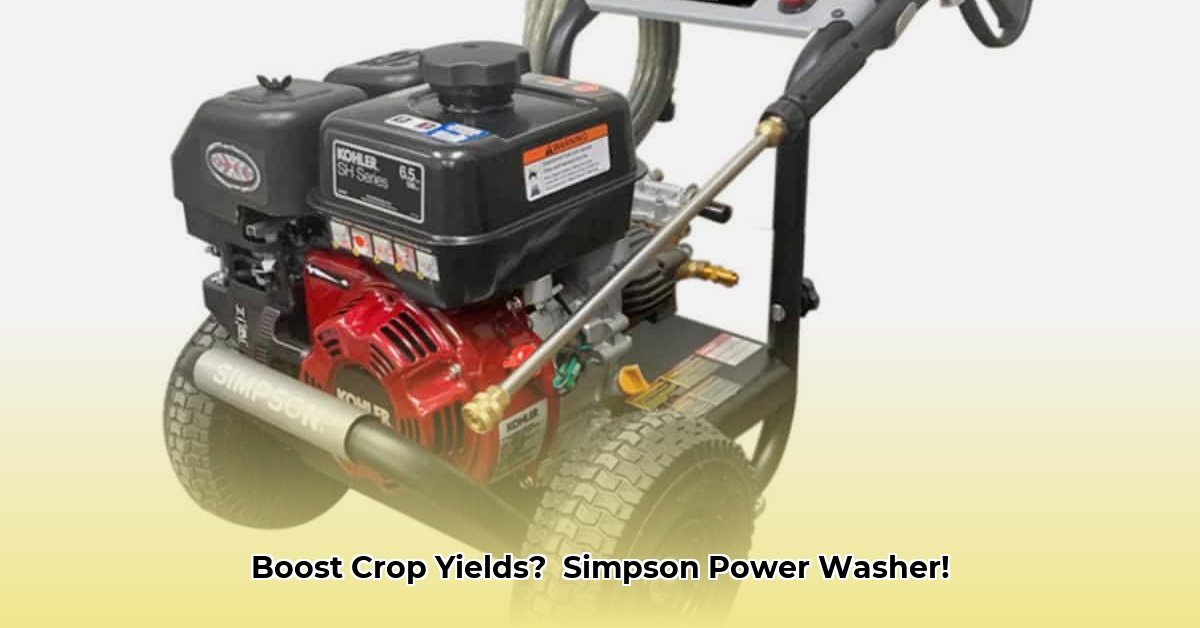
Optimize Irrigation: The Key to Higher Yields and Sustainable Farming
Keeping your irrigation system clean is crucial for maximizing crop yields and practicing sustainable agriculture. A clogged system wastes water, reduces efficiency, and diminishes your harvest. This guide outlines how a Simpson pressure washer from Tractor Supply can help you achieve optimal irrigation, benefiting both your bottom line and the environment. Did you know that efficient irrigation can increase yields by up to 20%?
The Untapped Potential of Clean Irrigation
Clogged irrigation systems lead to uneven water distribution, stressing plants and decreasing yields. "A clean irrigation system is fundamental to efficient water use and maximizing crop production," explains Dr. Emily Carter, Agricultural Engineer at Purdue University. This inefficiency translates directly to lower profits and wasted resources. This is a problem easily solved with regular maintenance.
Selecting the Right Pressure Washer: A Practical Guide
Choosing the perfect pressure washer involves considering several key factors. The wrong choice can damage your equipment, while the right one saves you time, money, and water.
PSI (Pounds per Square Inch): Higher PSI means greater cleaning power, but excessive PSI can damage irrigation components. Select a model with adjustable PSI settings to match your needs.
GPM (Gallons Per Minute): Higher GPM means faster cleaning, but it also consumes more water. Balance cleaning speed with water conservation needs.
Gas vs. Electric: Gas models are generally more powerful, but louder and requiring more maintenance. Electric models are quieter and easier to maintain, ideal for smaller operations.
Nozzle Types: Multiple nozzle settings offer versatility. A wider spray is ideal for initial cleaning; a more focused jet handles tough spots.
Tractor Supply's knowledgeable staff can guide you to the most appropriate model for your specific farm setup.
A Step-by-Step Cleaning Guide for Your Irrigation System
Cleaning your system doesn't have to be overwhelming. Follow these simple steps:
Preparation: Shut off the main water supply and disassemble removable parts like filters and sprinkler heads.
Cleaning: Use the appropriate nozzle and pressure setting on your Simpson pressure washer. Clean each component thoroughly, paying close attention to potentially clogged areas.
Inspection: Carefully inspect all parts for damage or leaks. Replace worn components immediately.
Reassembly: Reassemble the system, ensuring all connections are secure and watertight.
Testing: Turn the water back on, checking for leaks and ensuring even water distribution.
Long-Term Benefits: Beyond a Cleaner System
Consistent cleaning provides significant long-term advantages:
Water Conservation: Efficient water delivery minimizes waste, reducing costs and promoting sustainable practices.
Healthier Crops: Consistent hydration leads to healthier plants, resulting in higher yields and quality produce.
Extended Equipment Lifespan: Regular cleaning prevents premature wear and tear, extending the life of your irrigation equipment.
Reduced Repair Costs: Early detection of minor problems prevents them from escalating into costly repairs.
Simpson Pressure Washers: Weighing the Pros and Cons
While Simpson pressure washers offer numerous benefits, understanding both advantages and disadvantages is vital.
| Pros | Cons |
|---|---|
| Powerful cleaning, removes stubborn blockages | Requires careful use to prevent damage |
| Time and labor savings compared to manual cleaning | Can be noisy (gas models) |
| Wide availability at Tractor Supply and other retailers | Requires a certain level of skill for safe operation |
| Versatile for various cleaning tasks | Initial investment cost can be significant |
By investing in a Simpson pressure washer, farmers can achieve significant improvements in irrigation efficiency, leading to higher yield, reduced water consumption, and improved bottom lines. Ready to boost your crop yields and embrace sustainable farming practices?